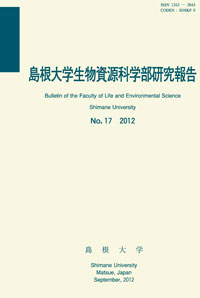島根大学生物資源科学部
ISSN:2435-0885(オンライン)
ISSN:1343-3644(冊子体)
なお、冊子体の刊行は23巻まで
ISSN:1343-3644(冊子体)
なお、冊子体の刊行は23巻まで

ダウンロード数 : ? 件
この文献の参照には次のURLをご利用ください : https://ir.lib.shimane-u.ac.jp/40646
島根大学生物資源科学部研究報告 22
2017-09-30 発行
有機・地域加工食品の消費者選好と付加価値の関係 : トマトジュースを対象とした選択実験を中心に
Relation Between Consumer Preference and Value Added of Organically and Locally Processed Foods: A Choice Experiment Study on Tomato Juice
長尾 愛
元島根大学生物資源科学部(2017年9月現在イギリスニューカッスル大学大学院)
保永 展利
島根大学生物資源科学部
ファイル
内容記述(抄録等)
This study clarifies the relation between consumer preference and value added of organically and locally processed foods. Using stated preference data obtained from investigation, we estimated consumer preferences and willingness to pay (WTP) for attributes of a processed food product (tomato juice) differentiated with respect to organic and local production labelling and a series of other claims such as food additives, concentrated or salted variants and price. Market survey was also conducted to compare with the WTP data. Results indicated that consumers were willing to pay more for a product made from locally or organically grown tomatoes. However, consumers preferred a product without food additives the most. Interaction effects between consumer preference and examinee attributes demonstrated that those with relatively high income chose tomato juice with better quality for all attributes. The comparisons indicated considerable differences between WTP and market value. For example, consumers indicated a WTP of ¥98 in value added of organically processed food, while a value of only ¥0.9 was actually added in the market. This implies that value added of organically processed food is less than it should be. On the other hand, consumers demonstrated a WTP of ¥76 in value added of locally processed food. While a value of ¥170 value was added in the market. This suggests that the market value of locally processed food is more than consumers' WTP and that the sale of locally processed food has been hampered by the price.
About This Article
権利関係
島根大学生物資源科学部
Other Article
PP. 13 - 16
